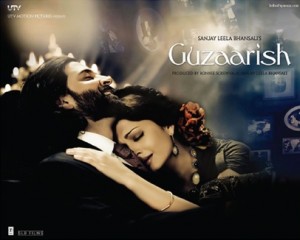Love & Death Bollywood tackles assisted suicide
 © Tatta Krishna Somya | Dreamstime.com
© Tatta Krishna Somya | Dreamstime.com Some of the most humanistic films currently being produced are coming out of the Mumbai, India-based Hindi-language film industry popularly known as Bollywood. A prime example is the 2010 movie Guzaarish, which tackles the subject of personal autonomy and assisted suicide. Complete with song, dance, and a compelling plot, it’s one of the best and most thought-provoking treatments of the subject I’ve ever seen.
One of the main differences between Western cinema and Bollywood is that in the West, if we tackle an important subject like assisted suicide, we do it through drama or as a documentary. Guzaarish gives us the full Bollywood treatment with romance, mystery, musical numbers, a love triangle, and a court drama all rolled into one.
Directed by Sanjay Leela Bhansali, the film stars the talented dancer and actor Hrithik Roshan in a performance that’s both charming and heartbreaking. The viewer comes to sympathize with his character Ethan so much that questions arise as to how we would respond if one of our dear friends or loved ones made the same sort of end-of-life decision that Ethan does.
Suicide is a complex issue. To fully understand the implications of any assisted-suicide policy, we ideally should weigh the pros and cons. The problem is that most of our discussions about it are polarized. We choose a side based on personal or partisan preferences and argue without really engaging in the proper give-and-take that’s required for critical thinking.
Likewise, one of the reasons it’s so hard to have a rational conversation about a person seeking help to end their life is that we all have a tendency to want to impose our ideas and our preferences on the actions and decisions of others. Do any of us have the right to second-guess another person’s decision about something as intimate as whether to continue living or not? And yet second-guessing is what we all do.
 This brings us to Guzaarish (which in English means “request”). Ethan Mascarenhas (played by Hrithik) is a former magician paralyzed from the neck down as a result of a stage accident. He’s made a new career for himself as a motivational disc jockey, encouraging his listeners not to give up hope. It doesn’t matter your situation, he tells them, live life to the fullest and live life joyously. Indeed, Ethan is a very humanistic character. But on the fourteenth anniversary of his accident, when he calls his lawyer and friend Devyani to request her assistance in obtaining the right to commit suicide, his message comes into question. After a judge rejects Ethan’s petition, Devyani urges him to garner public support through his radio show. His campaign, which he dubs “Project Euthanasia,” becomes a big story. People are shocked and everyone in the country thinks they have the right to weigh in on whether Ethan should be allowed to die or not.
This brings us to Guzaarish (which in English means “request”). Ethan Mascarenhas (played by Hrithik) is a former magician paralyzed from the neck down as a result of a stage accident. He’s made a new career for himself as a motivational disc jockey, encouraging his listeners not to give up hope. It doesn’t matter your situation, he tells them, live life to the fullest and live life joyously. Indeed, Ethan is a very humanistic character. But on the fourteenth anniversary of his accident, when he calls his lawyer and friend Devyani to request her assistance in obtaining the right to commit suicide, his message comes into question. After a judge rejects Ethan’s petition, Devyani urges him to garner public support through his radio show. His campaign, which he dubs “Project Euthanasia,” becomes a big story. People are shocked and everyone in the country thinks they have the right to weigh in on whether Ethan should be allowed to die or not.
Why would a man who’s so outwardly optimistic and happy, despite his condition, want to end his life? Wanting to die is a betrayal of what Ethan represents for millions of people. And yet, he wants to die and because he’s incapable of killing himself, he has to be granted permission to have someone help him. He wants to die badly enough to fight a court battle to win that right.
The way the story unfolds and the way in which our emotions and thoughts shift on whether we agree with Ethan’s request make for a very provocative and entertaining experience. At no point does this movie feel heavy handed because it approaches its subject as entertainment, not as a lecture designed to educate. As a result, it does both and probably was able to reach more people than a documentary on the subject ever could. I think American artists and activists can and should learn from this approach.
The movie is told in part through the eyes of Ethan’s nurse, Sofia, who disagrees with his request at first. It’s her transformation and her love for him that guides our own emotional journey through the film. How can those who love him not only accept his decision, but love him enough to let him go? After all, wanting someone we care about deeply to stick around is a normal emotion, even if it is a bit selfish.
In addition to flashbacks that show us who Ethan was before the accident, the movie also portrays the day-to-day struggles of being physically dependent on others for everything. At one point Ethan is in bed and it’s raining and there’s a leak right above his bed. The rain is dripping on his forehead and the man who’s supposed to be caring for him that evening has fallen asleep, so Ethan spends the entire night getting drenched because he can’t do anything about it.
More emotional is the scene where Sofia’s husband shows up to demand that she return home with him. He’s beating her and Ethan is not only unable to see what’s happening because he’s on his side, he’s also unable to come to her aid because he can’t move. It’s a heart-rending moment of humiliation and we realize, this is his life: a perpetual state of utter helplessness. But even that isn’t the real reason he wants to die.
Guzaarish does an excellent job of vetting all the different arguments against assisted suicide. We hear from Ethan’s fans, the local Catholic priest, his doctor, who doesn’t agree with his decision, as well as an ex-girlfriend and the magician who caused the accident out of jealousy. News commentators, complete strangers, and his closest friends are all allowed to chime in. All of these viewpoints are treated as loving and valid, but as ultimately irrelevant because the only person whose opinion matters is Ethan’s. It’s his life.
The film repeatedly makes the point that the right to die isn’t something that should be granted to everyone but, instead, on a case-by-case basis. This takes the discussion out of the realm of the abstract right smack-dab into the reality of what it means to an individual person. It forces us to humanize the choice by focusing on why this one individual has decided he wants to die and refocuses the debate where it belongs. We who are activists would be wise to invoke the human impact directly when we discuss these difficult issues.
Guzaarish doesn’t sugarcoat the topic, nor does it force its opinion on you. It simply provides a voice to all the different arguments for and against in an engaging way and helps you think through your own thoughts on the matter as if you were considering the possible death of a close friend.
While I won’t give away the ending, it’s very emotional and you will cry and that’s a good thing. Guzaarish was made to make you think about assisted suicide in a deep and comprehensive way but also to make you feel. It does an excellent job at both.![]()
